Imagine biting into your favorite crispy apple or laughing freely without worrying about your dentures slipping. For millions of Americans struggling with loose, uncomfortable dentures, this dream can become reality through denture implant technology. If you’re tired of dealing with messy adhesives, embarrassing moments, and restricted food choices, you’re about to discover a solution that could transform not just your smile, but your entire quality of life.
Key Takeaways
- Denture implants combine the stability of dental implants with the comprehensive coverage of dentures, offering superior comfort and function
- Multiple options exist, from implant-supported dentures to full-mouth reconstruction, allowing personalized treatment plans
- While Medicare typically doesn’t cover dental implants, various financing options and insurance plans can make treatment accessible
- The procedure involves a step-by-step process that prioritizes your comfort and long-term success
- Proper care and maintenance can make your denture implant last decades, providing exceptional value for your investment
What Is a Denture Implant?
A denture implant is a permanent tooth replacement solution that combines dental implants with denture prosthetics. Unlike traditional dentures that rest on gums, denture implants are secured to titanium posts surgically placed in the jawbone, providing superior stability, chewing power, and preventing bone loss. Common types include snap-in dentures (removable), All-on-4 (fixed, 4 implants), and All-on-6 (fixed, 6 implants).
The term “denture implant” actually encompasses several different treatment options, each designed to meet specific needs and preferences. Whether you’re missing a few teeth or need complete mouth restoration, there’s likely a denture implant solution that’s perfect for your situation.
How Denture Implants Differ from Traditional Dentures
Traditional dentures rely on suction and adhesives to stay in place, which often leads to:
- Slipping and sliding during eating or speaking
- Sore spots from constant rubbing against gums
- Limited food choices due to reduced chewing power
- Bone loss over time as the jaw isn’t properly stimulated
Denture implants solve these problems by providing:
- Permanent stability through osseointegration with your jawbone
- Natural chewing force restored to nearly normal levels
- Preserved facial structure by preventing bone loss
- Enhanced confidence in social and professional situations
Types of Denture Implant Solutions
Understanding your options is crucial for making the best decision for your smile. Each type of denture implant offers unique benefits depending on your specific needs, bone density, and lifestyle preferences.
Implant-Supported Dentures
Implant-supported dentures use 2-4 strategically placed implants to secure a full arch of replacement teeth. This option provides excellent stability while being more affordable than individual implants for each tooth.
Benefits:
- Significantly improved chewing ability
- Enhanced speech clarity
- Reduced gum irritation
- Easy removal for cleaning
Ideal for: Patients who want improved stability but prefer a removable option for maintenance.
All-on-4 Denture Implants
The All-on-4 technique uses four precisely angled implants to support a complete arch of teeth. This innovative approach often eliminates the need for bone grafting, even in patients with some bone loss.
Advantages:
- Often completed in a single day
- Lower cost than individual implants
- Suitable for many patients with bone loss
- Immediate function and aesthetics
All-on-6 Denture Implants
All-on-6 systems use six implants for even greater stability and load distribution. This option provides maximum security and is ideal for patients who want the ultimate in chewing power and longevity.
Key features:
- Superior stability and durability
- Excellent for heavy chewers
- Better load distribution
- Enhanced long-term success rates
Individual Implant-Supported Crowns
For patients seeking the most natural solution, individual implants can replace each missing tooth with a separate crown. While more expensive, this approach offers unparalleled function and aesthetics.
The Denture Implant Procedure: Your Journey to a Better Smile
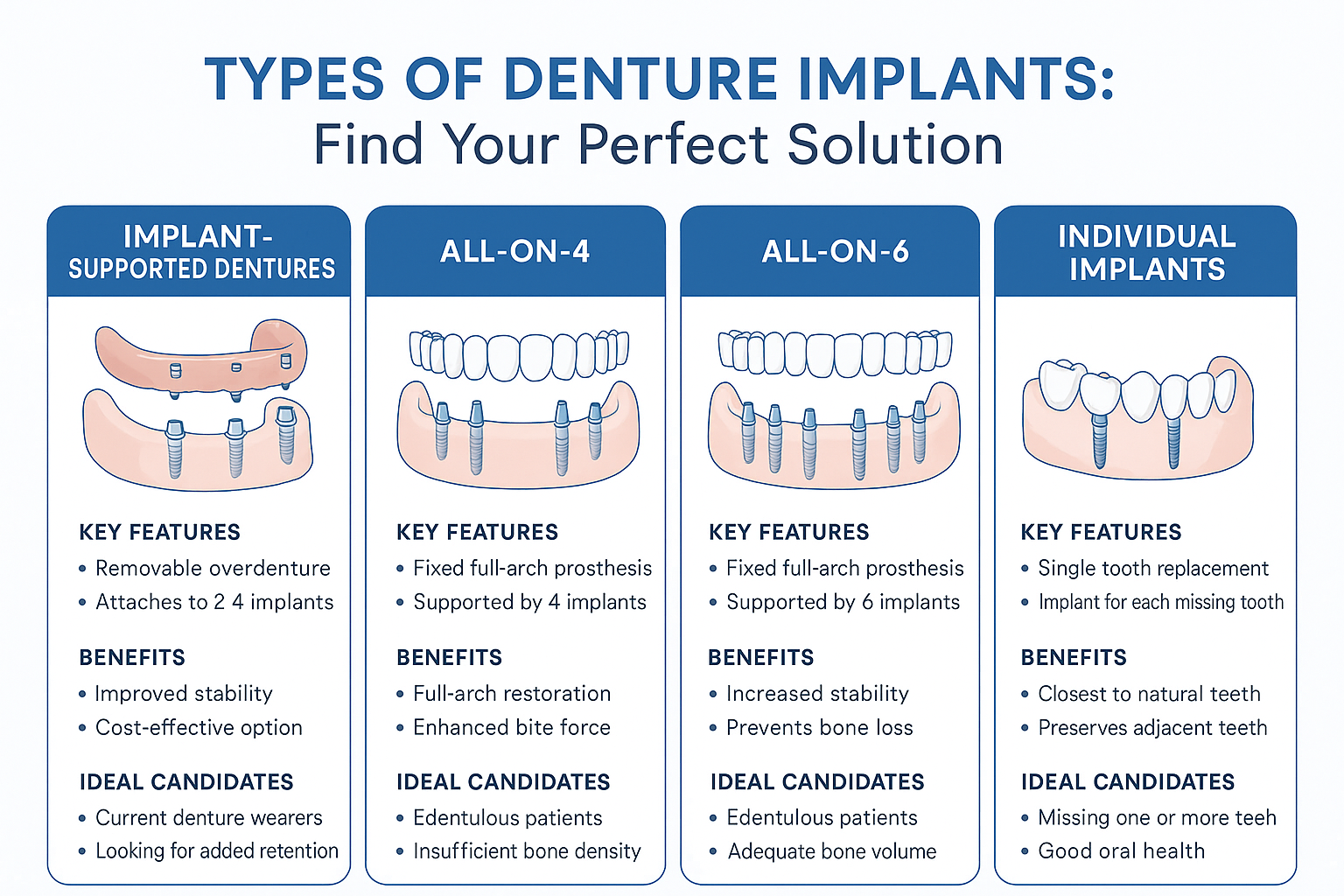
Understanding what to expect during your dental implant procedure helps reduce anxiety and ensures you’re fully prepared for your transformation. The process is carefully planned and executed in stages to maximize your comfort and success.
Initial Consultation and Planning
Your journey begins with a comprehensive evaluation that includes:
- Digital imaging and 3D scans of your jaw structure
- Medical history review to ensure you’re a good candidate
- Treatment planning customized to your specific needs
- Cost discussion and financing options
- Timeline establishment for your complete treatment
Surgical Placement Phase
During the implant placement surgery:
- Local anesthesia ensures your comfort throughout the procedure
- Precise implant positioning using advanced surgical guides
- Immediate temporary teeth in many cases
- Post-operative care instructions for optimal healing
Most patients are surprised by how comfortable the procedure is and how quickly they can return to normal activities.
Healing and Integration Period
The osseointegration process typically takes 3-6 months, during which:
- Your jawbone grows around and fuses with the titanium implants
- Temporary teeth allow you to function normally
- Regular check-ups monitor your healing progress
- Your final restoration is carefully crafted
Final Restoration Placement
Once healing is complete, your permanent denture implant is attached, providing:
- Perfect fit and optimal comfort
- Natural appearance that complements your facial features
- Full function for eating all your favorite foods
- Long-lasting results with proper care
🦷 Denture Implant Cost Calculator
💰 Estimated Treatment Cost
Many patients qualify for monthly payment plans starting as low as $200-400/month. Contact our Dallas office to discuss insurance coverage and flexible financing options.
Cost Considerations and Insurance Coverage
One of the most common questions we hear is about denture implant costs and whether insurance will help cover the investment. While the initial cost may seem significant, it’s important to consider the long-term value and improved quality of life that denture implants provide.
Understanding Denture Implant Costs
Denture implant costs vary based on several factors:
- Type of treatment (implant-supported dentures vs. All-on-4 vs. individual implants)
- Number of implants needed
- Additional procedures (bone grafting, extractions, sinus lifts)
- Geographic location and practice expertise
- Materials and technology used
Typical Cost Ranges
| Treatment Type | Cost Range |
|---|---|
| Implant-Supported Dentures (per arch) | $15,000 – $25,000 |
| All-on-4 (per arch) | $25,000 – $35,000 |
| All-on-6 (per arch) | $35,000 – $50,000 |
| Individual Implants | $4,000 – $6,000 each |
Medicare and Insurance Coverage
Unfortunately, Medicare typically does not cover dental implants or denture implants, as they’re often classified as cosmetic rather than medically necessary procedures. However, there are exceptions and alternative coverage options:
Potential Coverage Sources:
- Medicare Advantage plans may offer some dental benefits
- Private dental insurance may cover a portion of the cost
- Medical insurance might cover implants if they’re medically necessary due to accident or disease
- Flexible Spending Accounts (FSA) and Health Savings Accounts (HSA) can be used
Making Treatment Affordable
Don’t let cost concerns prevent you from exploring your options. Many dental implant centers offer financing solutions:
- In-house payment plans with low or no interest
- Third-party financing through companies like CareCredit
- Seasonal promotions and discount programs
- Package deals for multiple implants or full-mouth reconstruction
Benefits of Choosing Denture Implants
The decision to invest in denture implants goes far beyond just improving your smile. Patients consistently report life-changing benefits that extend into every aspect of their daily lives.
Functional Benefits
Restored Chewing Power: Denture implants can restore up to 90% of your natural chewing force, compared to just 25% with traditional dentures. This means you can enjoy:
- Crispy apples and fresh vegetables
- Nuts and seeds
- Corn on the cob
- Steaks and other tough meats
Improved Speech: Secure denture implants eliminate the mumbling and clicking sounds associated with loose dentures, giving you confidence in:
- Professional presentations
- Social conversations
- Phone calls
- Public speaking
Enhanced Comfort: No more sore spots, irritation, or the need for messy adhesives. Your denture implant becomes a natural part of your mouth.
Health Benefits
Bone Preservation: Unlike traditional dentures, implants stimulate your jawbone, preventing the bone loss that leads to facial collapse and premature aging.
Better Nutrition: With improved chewing ability, you can maintain a healthier diet rich in fruits, vegetables, and proteins that might have been difficult to eat before.
Oral Health: Denture implants are easier to clean and maintain than traditional dentures, reducing your risk of gum disease and other oral health issues.
Lifestyle Benefits
Social Confidence: No more worrying about dentures slipping during important moments. Laugh, smile, and speak with complete confidence.
Professional Advantages: Clear speech and a confident smile can positively impact your career and professional relationships.
Active Lifestyle: Participate in sports, travel, and other activities without worrying about denture problems.
Candidacy for Denture Implants
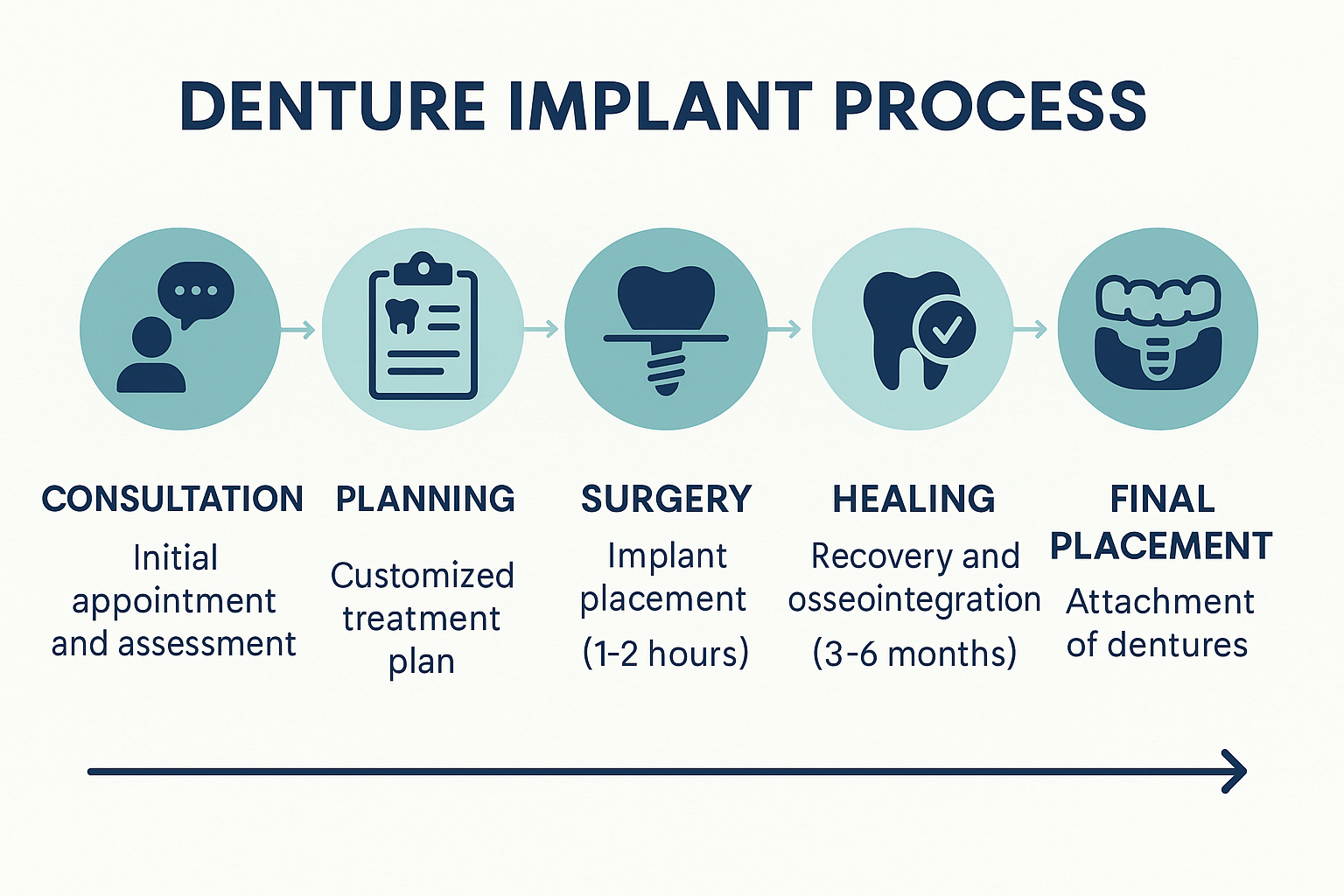
Not everyone is automatically a candidate for denture implants, but advances in technology and techniques have made treatment possible for more people than ever before. Understanding the requirements helps set realistic expectations for your treatment journey.
Ideal Candidates
Good candidates typically have:
- Adequate bone density to support implants
- Healthy gums and oral tissues
- Good overall health
- Realistic expectations about treatment outcomes
- Commitment to proper oral hygiene
- Non-smokers or willingness to quit smoking
Medical Considerations
Certain medical conditions may affect your candidacy, but they don’t necessarily disqualify you:
Manageable Conditions:
- Diabetes (well-controlled)
- Heart disease (stable)
- Osteoporosis (with proper precautions)
- Previous cancer treatment (with oncologist clearance)
Conditions Requiring Special Consideration:
- Active cancer treatment
- Uncontrolled diabetes
- Recent heart attack or stroke
- Certain medications affecting bone healing
Age Considerations
There’s no upper age limit for denture implants. We’ve successfully treated patients well into their 80s and 90s. The key factors are overall health and healing ability, not chronological age.
Younger patients (under 18) typically need to wait until jaw growth is complete before implant placement.
Comparing Denture Implant Options
Choosing the right type of denture implant depends on your specific needs, preferences, and circumstances. Let’s explore how different options compare to help you make an informed decision.
Removable vs. Fixed Solutions
Removable Implant-Supported Dentures:
- ✅ Lower initial cost
- ✅ Easier to clean
- ✅ Can be removed for maintenance
- ❌ Still some movement during eating
- ❌ Need to be removed nightly
Fixed Denture Implants (All-on-4/6):
- ✅ Maximum stability
- ✅ No removal required
- ✅ Most natural feeling
- ✅ Clean like natural teeth
- ❌ Higher initial investment
- ❌ Professional cleaning required
Number of Implants Needed
The number of implants affects both cost and function:
2-4 Implants (Lower arch):
- Significant improvement over traditional dentures
- Good for patients with adequate bone
- Most cost-effective implant solution
4-6 Implants (Full arch):
- Maximum stability and chewing power
- Better load distribution
- Suitable for heavy chewers
- Enhanced long-term success
Material Choices
Acrylic Teeth:
- More affordable option
- Easily repairable
- Softer, may wear over time
Porcelain Teeth:
- Most natural appearance
- Highly stain-resistant
- Excellent durability
- Higher initial cost
Zirconia (All-Ceramic):
- Premium option
- Exceptional strength
- Metal-free
- Most biocompatible
Recovery and Aftercare
Understanding what to expect during recovery helps ensure the best possible outcome for your denture implant treatment. Most patients are pleasantly surprised by how comfortable and manageable the recovery process is.
Immediate Post-Surgery Care
First 24-48 Hours:
- Pain management: Most patients experience minimal discomfort, easily managed with over-the-counter pain relievers
- Swelling control: Ice packs applied for 15 minutes on, 15 minutes off
- Diet modifications: Soft foods and liquids initially
- Activity restrictions: Avoid strenuous exercise for a few days
First Week:
- Oral hygiene: Gentle cleaning around implant sites
- Diet progression: Gradually introduce firmer foods
- Follow-up appointment: Monitor healing progress
- Medication compliance: Take antibiotics as prescribed
Long-Term Recovery Timeline
Weeks 2-4:
- Swelling completely resolved
- Return to normal activities
- Soft tissue healing well established
- Temporary restoration adjustments if needed
Months 2-6:
- Osseointegration progressing
- Regular monitoring appointments
- Preparation for final restoration
- Gradual return to normal diet
Signs of Successful Healing
Positive indicators include:
- Decreasing discomfort over time
- No persistent swelling or bleeding
- Stable temporary restorations
- Healthy pink gum tissue around implants
When to Contact Your Dentist
Call immediately if you experience:
- Severe pain not controlled by medication
- Excessive bleeding
- Signs of infection (fever, pus, persistent swelling)
- Loose or damaged temporary restorations
Maintenance and Longevity
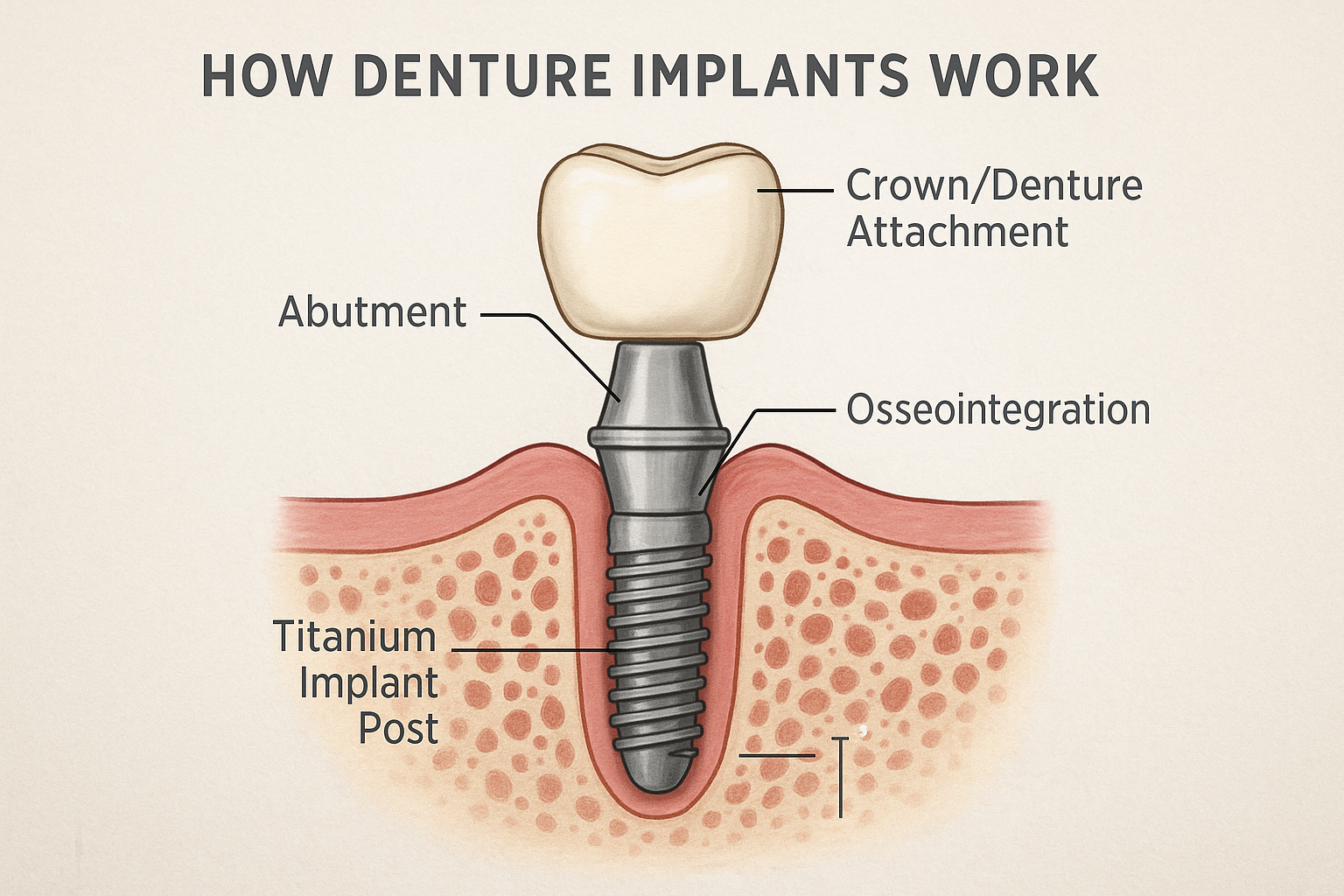
One of the greatest advantages of denture implants is their potential for decades of reliable service with proper care. Understanding how to maintain your investment ensures you’ll enjoy the benefits for years to come.
Daily Care Routine
Morning Routine:
- Rinse with antibacterial mouthwash
- Brush with a soft-bristled toothbrush
- Floss using implant-specific floss or water flosser
- Inspect for any changes or concerns
Evening Routine:
- Remove food particles with water flossing
- Brush thoroughly around implant sites
- Use interdental brushes for hard-to-reach areas
- Apply fluoride if recommended
Professional Maintenance
Regular dental visits are crucial for long-term success:
Every 3-6 Months:
- Professional cleaning and examination
- X-rays to monitor bone levels
- Adjustment of restorations if needed
- Early detection of any issues
Annual Comprehensive Exam:
- Detailed assessment of implant health
- Bite analysis and adjustment
- Replacement of worn components
- Update of medical history
Lifestyle Factors Affecting Longevity
Positive Factors:
- Non-smoking: Dramatically improves success rates
- Good nutrition: Supports bone and gum health
- Regular exercise: Improves overall health and healing
- Stress management: Reduces teeth grinding and clenching
Risk Factors to Avoid:
- Smoking or tobacco use
- Excessive alcohol consumption
- Neglecting oral hygiene
- Skipping dental appointments
- Using teeth as tools
Expected Lifespan
With proper care, denture implants can last:
- Implant posts: 25+ years to lifetime
- Crowns/prosthetics: 10-15 years before replacement
- Overall system: Decades of reliable function
The investment in complete dental implants pays dividends in improved quality of life and long-term oral health.
Potential Risks and Complications
While denture implant procedures have high success rates (over 95%), it’s important to understand potential risks and how they’re minimized through proper planning and care.
Common Minor Complications
Temporary Issues:
- Swelling and bruising: Normal healing response, resolves in days
- Minor bleeding: Expected initially, stops with proper care
- Temporary numbness: Usually resolves as swelling decreases
- Difficulty eating: Improves as you adapt to your new teeth
Rare but Serious Complications
Implant Failure:
- Occurs in less than 5% of cases
- Often related to poor healing or inadequate bone
- May require implant removal and replacement
- Prevention through careful patient selection and planning
Infection:
- Rare with proper antibiotic protocols
- Symptoms include persistent pain, swelling, and fever
- Treated aggressively with antibiotics or drainage
- Prevention through excellent oral hygiene
Nerve Damage:
- Extremely rare with modern imaging and planning
- May cause temporary or permanent numbness
- Careful surgical technique minimizes risk
- Pre-surgical imaging identifies nerve locations
Risk Minimization Strategies
Pre-Surgical Planning:
- 3D imaging to assess bone and nerve locations
- Medical history review and optimization
- Smoking cessation counseling
- Realistic expectation setting
Surgical Excellence:
- Board-certified oral surgeons
- Sterile surgical techniques
- Advanced surgical guides
- Conservative treatment planning
Post-Operative Care:
- Detailed aftercare instructions
- Antibiotic prophylaxis when indicated
- Regular follow-up appointments
- Patient education and support
Alternatives to Denture Implants
While denture implants offer superior benefits for most patients, it’s important to understand all available options to make the best decision for your specific situation and circumstances.
Traditional Complete Dentures
Conventional dentures remain a viable option for some patients:
Advantages:
- Lower initial cost
- Non-surgical option
- Familiar to many patients
- Can be adjusted or remade easily
Disadvantages:
- Limited chewing efficiency
- Potential for slipping and discomfort
- Bone loss continues over time
- Social anxiety about stability
Best for: Patients who aren’t surgical candidates or prefer a non-invasive approach.
Partial Dentures
For patients missing some but not all teeth, partial dentures can be an alternative:
Considerations:
- Less expensive than individual implants
- Removable for cleaning
- May damage remaining natural teeth
- Less stable than implant solutions
Dental Bridges
Traditional bridges can replace small sections of missing teeth:
Pros:
- Fixed in place
- Good aesthetics
- Proven track record
- Insurance may cover more
Cons:
- Requires alteration of healthy adjacent teeth
- Limited lifespan (10-15 years)
- Difficult to clean underneath
- Doesn’t prevent bone loss
Learn more about dental implant bridges as an alternative solution.
Mini Dental Implants
Mini implants offer a less invasive option:
Benefits:
- Smaller surgical procedure
- Lower cost
- Faster healing
- Good for narrow spaces
Limitations:
- Less stability than full-size implants
- Not suitable for all cases
- May have shorter lifespan
- Limited chewing force improvement
Finding the Right Provider
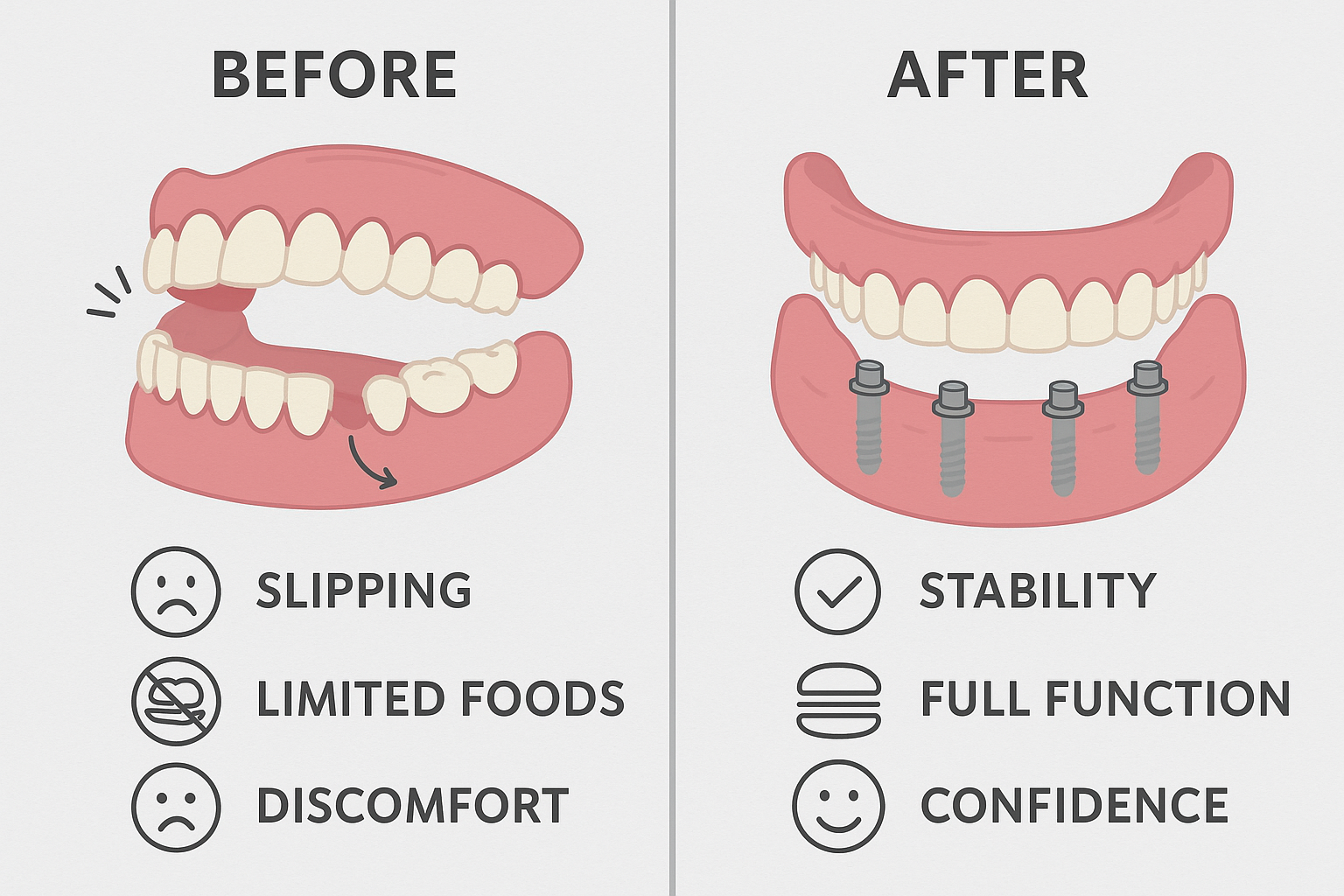
Choosing the right dental professional for your denture implant treatment is crucial for achieving optimal results. The expertise and experience of your treatment team directly impact both your immediate comfort and long-term success.
Qualifications to Look For
Essential Credentials:
- Board certification in oral surgery or periodontics
- Advanced training in implant dentistry
- Continuing education in latest techniques
- Hospital privileges for complex cases
- Professional memberships in implant organizations
Experience Indicators:
- Years performing implant procedures
- Number of cases completed annually
- Before-and-after case studies
- Patient testimonials and reviews
- Complication management experience
Technology and Facilities
Modern practices should offer:
- 3D imaging and CT scans for precise planning
- Computer-guided surgery for accuracy
- In-house laboratory for faster turnaround
- Sedation options for patient comfort
- Emergency availability for post-operative care
Questions to Ask Potential Providers
During Your Consultation:
- How many denture implant cases do you complete annually?
- What is your success rate for this type of treatment?
- Can you show me before-and-after photos of similar cases?
- What happens if complications arise?
- Do you offer financing options?
- What is included in the treatment fee?
- How do you handle emergency situations?
Red Flags to Avoid
Warning signs include:
- Pressure to decide immediately
- Prices significantly below market rates
- Lack of proper credentials or licensing
- No clear treatment plan or timeline
- Unwillingness to provide references
- Outdated equipment or facilities
When researching providers, consider visiting established dental implant centers that specialize in these procedures and have proven track records of success.
The Future of Denture Implant Technology
The field of implant dentistry continues to evolve rapidly, with new technologies and techniques making treatment more predictable, comfortable, and accessible than ever before.
Current Innovations
Digital Treatment Planning:
- 3D virtual planning allows precise implant placement
- Surgical guides ensure accuracy during surgery
- Virtual smile design lets you see results before treatment
- Digital impressions eliminate messy traditional molds
Advanced Materials:
- Titanium alloys with enhanced biocompatibility
- Zirconia implants for metal-free solutions
- Surface treatments that accelerate healing
- Antimicrobial coatings to prevent infection
Minimally Invasive Techniques:
- Flapless surgery reduces healing time
- Immediate loading allows same-day teeth
- Computer-guided placement minimizes tissue trauma
- Piezoelectric surgery for precise bone preparation
Emerging Technologies
Regenerative Medicine:
- Stem cell therapy to enhance healing
- Growth factors to accelerate bone formation
- Tissue engineering for bone and gum regeneration
- Platelet-rich plasma to improve outcomes
Artificial Intelligence:
- Treatment planning algorithms for optimal results
- Predictive modeling for success rates
- Automated design of custom restorations
- Risk assessment tools for better patient selection
What This Means for Patients
These advances translate to:
- Shorter treatment times
- More predictable outcomes
- Enhanced comfort during and after treatment
- Better long-term results
- Expanded candidacy for more patients
Real Patient Success Stories
Nothing speaks to the life-changing potential of denture implants quite like the experiences of real patients who have undergone treatment. These stories illustrate the profound impact that stable, functional teeth can have on every aspect of life.
Professional Transformation
“As a sales manager, my confidence was everything. My loose dentures made me mumble during presentations, and I was constantly worried about embarrassing moments. Six months after getting my All-on-4 denture implants, I closed the biggest deal of my career. I credit my renewed confidence and clear speech to my new smile.” – Robert, 58
Social Life Revival
“I hadn’t eaten out with friends in years because I was so embarrassed about my dentures. Now, with my implant-supported dentures, I can eat anything I want. Last week, I enjoyed corn on the cob at a family barbecue for the first time in a decade. It felt like getting my life back.” – Maria, 65
Health and Nutrition Improvements
“My doctor was concerned about my nutrition because I could only eat soft foods with my old dentures. Since getting my denture implants, I’ve been able to eat fresh fruits, vegetables, and lean proteins again. My energy levels have improved dramatically, and my last blood work showed significant improvements.” – James, 72
Unexpected Benefits
Many patients report benefits they never anticipated:
- Better sleep due to improved jaw alignment
- Reduced headaches from proper bite function
- Improved digestion from better chewing
- Enhanced facial support that reduces wrinkles
- Increased exercise tolerance from better nutrition
Making Your Decision
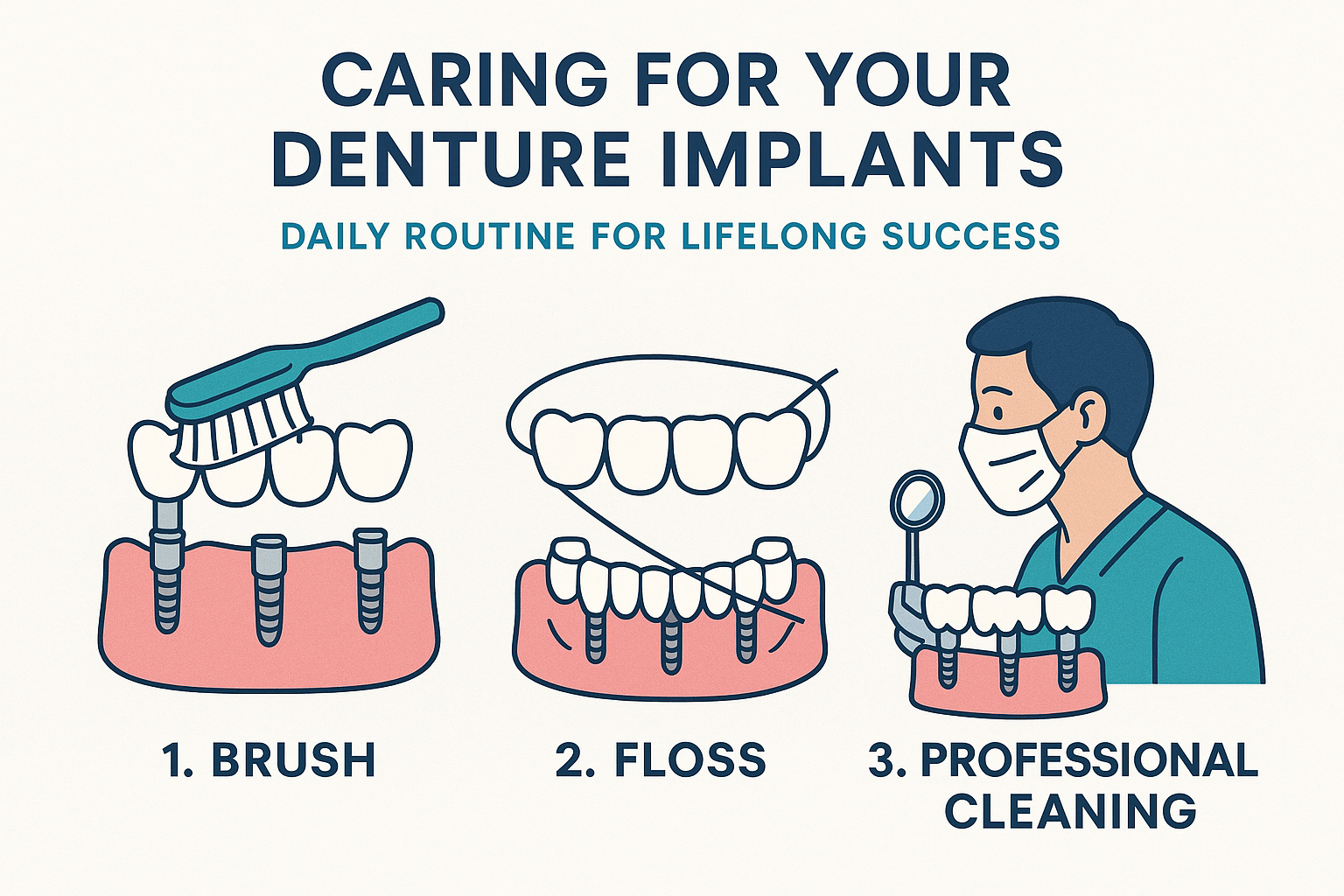
Choosing to move forward with denture implant treatment is a significant decision that involves considerations beyond just the clinical aspects. Taking time to thoroughly evaluate your options ensures you make the choice that’s right for your unique situation.
Factors to Consider
Personal Priorities:
- How important is eating your favorite foods?
- Do you want a removable or permanent solution?
- What’s your comfort level with surgical procedures?
- How does your current situation affect your quality of life?
Practical Considerations:
- Timeline: How quickly do you need results?
- Budget: What financing options work for your situation?
- Support system: Do you have help during recovery?
- Work schedule: When can you take time off for treatment?
Long-term Perspective:
- What will your needs be in 10-20 years?
- How important is the longevity of the solution?
- Are you committed to proper maintenance?
- What are the costs of doing nothing?
Questions for Self-Reflection
Before making your final decision, consider:
- How is my current situation affecting my daily life?
- What would having stable, functional teeth mean to me?
- Am I ready to commit to the treatment process?
- Do I have realistic expectations about the outcomes?
- Have I explored all my options thoroughly?
Taking the Next Step
If you’re considering denture implant treatment:
Schedule a consultation with a qualified implant specialist to:
- Assess your candidacy for treatment
- Discuss your specific goals and concerns
- Review treatment options and timelines
- Understand costs and financing options
- Get answers to all your questions
Remember, the consultation is an opportunity to gather information—there’s no pressure to make an immediate decision.
Conclusion
Denture implants represent a revolutionary advancement in tooth replacement technology, offering hope and renewed confidence to millions of people struggling with missing teeth or uncomfortable dentures. Whether you’re considering implant-supported dentures, All-on-4 treatment, or individual implant crowns, the benefits extend far beyond just improving your smile.
The journey from loose, uncomfortable dentures to stable, functional teeth can truly be life-changing. Patients consistently report improvements in their ability to eat, speak, and socialize with confidence. The preservation of facial structure, prevention of bone loss, and enhancement of overall oral health make denture implants an investment in your long-term well-being.
While the initial cost may seem significant, the long-term value—measured in improved quality of life, better nutrition, enhanced confidence, and decades of reliable function—makes denture implants an exceptional investment in your health and happiness.
Your journey to a better smile starts with a single step. If you’re tired of dealing with loose dentures, restricted food choices, or social anxiety about your teeth, it’s time to explore your options. The technology, techniques, and financing options available today make this life-changing treatment more accessible than ever before.
Don’t let another day pass feeling less than confident about your smile. Contact a qualified dental implant specialist today to schedule your consultation and take the first step toward rediscovering the joy of eating, speaking, and smiling without worry. Your new smile—and the confidence that comes with it—is waiting for you.
Remember, you deserve to smile with confidence, eat the foods you love, and live life to the fullest. Denture implants can help make that dream a reality.

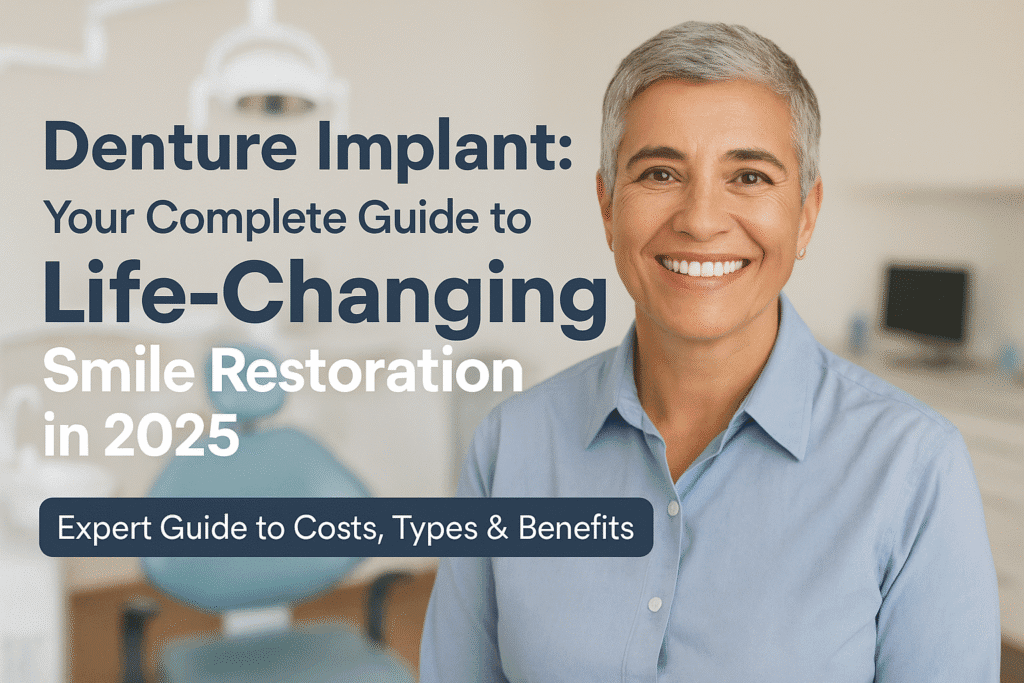
Leave a Reply
Share your thoughts or ask a question about dental implants. Your email address will not be published.